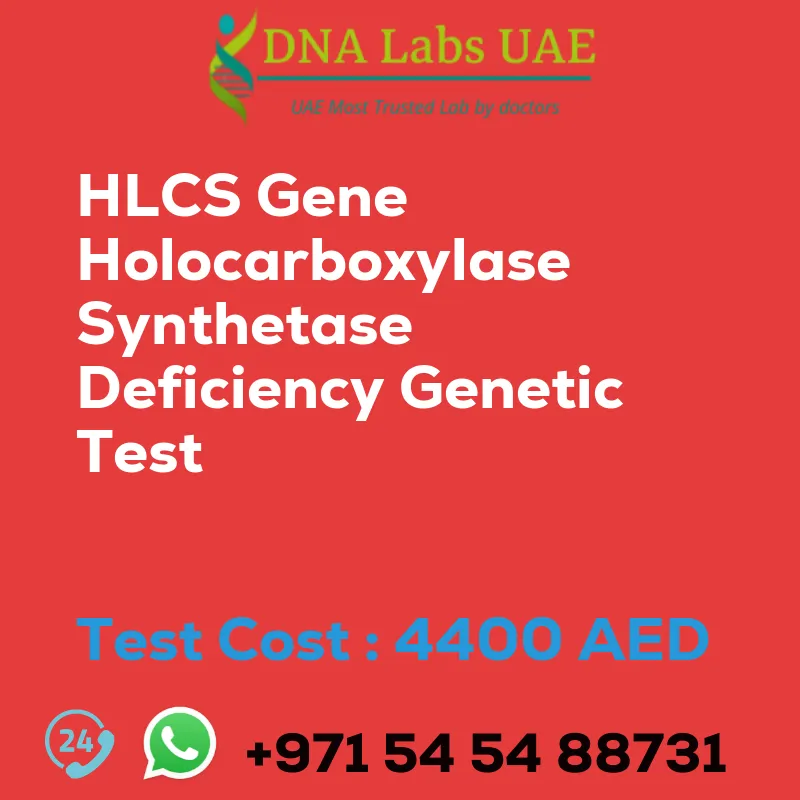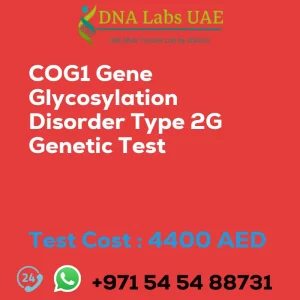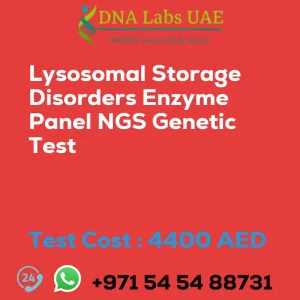HLCS Gene Holocarboxylase Synthetase Deficiency Genetic Test
At DNA Labs UAE, we offer the HLCS Gene Holocarboxylase Synthetase Deficiency Genetic Test. This test helps in diagnosing holocarboxylase synthetase deficiency, a rare genetic disorder that affects the activity of the holocarboxylase synthetase enzyme.
Test Components and Price
The HLCS Gene Holocarboxylase Synthetase Deficiency Genetic Test is priced at 4400.0 AED. The test requires a blood sample, extracted DNA, or one drop of blood on an FTA card.
Report Delivery and Method
After the sample is collected, the report will be delivered within 3 to 4 weeks. The test is performed using NGS (Next-Generation Sequencing) technology.
Test Type and Doctor
The HLCS Gene Holocarboxylase Synthetase Deficiency Genetic Test falls under the category of metabolic disorders. It is recommended to consult with a general physician for this test.
Test Department and Pre Test Information
The test is conducted in our Genetics department. Before undergoing the HLCS Gene Holocarboxylase Synthetase Deficiency Genetic Test, it is important to provide the clinical history of the patient. Additionally, a genetic counseling session is recommended to draw a pedigree chart of family members affected by Holocarboxylase Synthetase Deficiency.
Test Details
The HLCS gene, also known as holocarboxylase synthetase gene, encodes the enzyme holocarboxylase synthetase. This enzyme is responsible for attaching biotin, a B-vitamin, to certain proteins in the body. Proper biotin attachment is crucial for the functioning of these proteins.
Holocarboxylase synthetase deficiency is a rare genetic disorder that affects the activity of the holocarboxylase synthetase enzyme. This deficiency impairs the biotin attachment to proteins, leading to their malfunctioning. Symptoms of this deficiency may include skin rash, hair loss, neurological problems, developmental delay, and metabolic abnormalities.
NGS genetic testing, which uses advanced sequencing technologies, can be used to analyze the HLCS gene for any mutations or variations that may be causing holocarboxylase synthetase deficiency. This test is not only helpful in diagnosing the deficiency but also for carrier testing and prenatal testing.
The HLCS Gene Holocarboxylase Synthetase Deficiency Genetic Test involves obtaining a DNA sample, usually through a blood sample or cheek swab, and analyzing the DNA sequence of the HLCS gene using NGS technology. The results of the test can provide valuable information about the genetic cause of the deficiency and guide treatment and management options for affected individuals and their families.
| Test Name | HLCS Gene Holocarboxylase synthetase deficiency Genetic Test |
|---|---|
| Components | |
| Price | 4400.0 AED |
| Sample Condition | Blood or Extracted DNA or One drop Blood on FTA Card |
| Report Delivery | 3 to 4 Weeks |
| Method | NGS Technology |
| Test type | Metabolic Disorders |
| Doctor | General Physician |
| Test Department: | Genetics |
| Pre Test Information | Clinical History of Patient who is going for HLCS Gene Holocarboxylase synthetase deficiency NGS Genetic DNA Test A Genetic Counselling session to draw a pedigree chart of family members affected with Holocarboxylase synthetase deficiency |
| Test Details |
HLCS gene, also known as holocarboxylase synthetase gene, encodes the enzyme holocarboxylase synthetase. This enzyme is responsible for attaching biotin, a B-vitamin, to certain proteins in the body. This biotin attachment is essential for the proper functioning of these proteins. Holocarboxylase synthetase deficiency is a rare genetic disorder that affects the activity of the holocarboxylase synthetase enzyme. This deficiency leads to impaired biotin attachment to proteins, resulting in the malfunctioning of these proteins. The deficiency can cause a range of symptoms including skin rash, hair loss, neurological problems, developmental delay, and metabolic abnormalities. NGS (Next-Generation Sequencing) genetic testing is a type of genetic test that uses advanced sequencing technologies to analyze multiple genes simultaneously. In the case of HLCS gene testing, NGS can be used to identify any mutations or variations in the HLCS gene that may be causing the holocarboxylase synthetase deficiency. NGS genetic testing for HLCS gene can help in the diagnosis of holocarboxylase synthetase deficiency and can also be used for carrier testing and prenatal testing. It involves obtaining a DNA sample, usually through a blood sample or cheek swab, and analyzing the DNA sequence of the HLCS gene using NGS technology. The results of the test can provide valuable information about the genetic cause of the deficiency and can guide treatment and management options for affected individuals and their families. |








